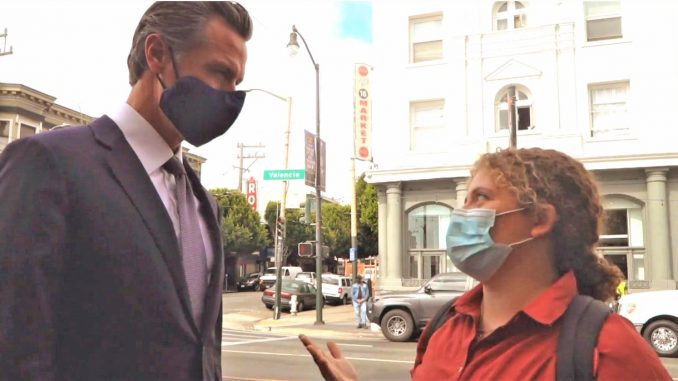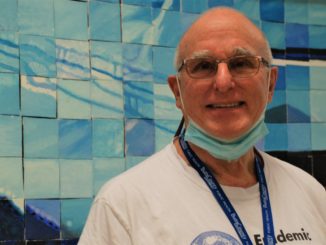
This story is produced by the award-winning journalism nonprofit Capital & Main and co-published here with permission.
It was almost on cue. First came California Gov. Gavin Newsom’s announcement that the state was lifting its mask mandate for vaccinated people in most indoor settings. What followed was not a celebration but another challenge: Why didn’t the schools follow suit?
It’s a fair question. It is also a question more nuanced than the public shouting might make it appear. Perhaps that is one reason why Newsom’s secretary of Health and Human Services, Dr. Mark Ghaly, said the decision on school masking won’t come for at least another two weeks.
“Masking requirements were never put in place to be there forever,” Ghaly said during a Feb. 14 news conference. Still, the secretary did not commit to a firm exit plan from school masking policies, promising only to reexamine the COVID-19 numbers by Feb. 28 and proceeding from there.
The eventual decision broadly concerns public health. But it involves multiple stakeholders, including parents, students, staff, California’s 1,037 individual school districts and some of the state’s most powerful teachers’ unions, who’ve supported Newsom in the past and have a seat at the table for these conversations.
“We need to continue to follow the science and look at local transmission rates and hospitalizations in guiding COVID-19 decisions,” said E. Toby Boyd, president of the 310,000-member California Teachers Association. “We support the administration’s decision to pause and gather more information to make a science-based decision on school masking that responds to this moment in the pandemic and helps the state transition with an eye on equity.” [Disclosure: The CTA is a financial supporter of Capital & Main.]
Despite the controversies surrounding the state’s COVID policies in schools, California has posted a mostly enviable record of keeping classrooms open. It is responsible for only 1 percent of the nation’s school closures despite accounting for 12 percent of all public-school students, Ghaly said.
Some of Newsom’s health advisers believe that masking students is a large factor in that result, and they worry that a premature end to the policy will spike COVID numbers again or put teachers and staff at unreasonable risk. Although recent statistics indicate that the omicron variant is loosening its grip on the state, the virus is still very active.
California health officials on Feb. 18 reported a 5.4 percent positive test rate. That’s a steep drop from early January rates of 20 percent or more, but still well above pre-omicron averages. Daily hospitalizations, which peaked in late January, also were on the wane. (COVID-related deaths, a lagging indicator, were up just slightly on a seven-day average.)
With the leading numbers decreasing, Newsom declared that the state had a “date with destiny” when it came to lifting mask restrictions. In large measure, that’s because nearly three-quarters of all Californians age 5 and up are fully vaccinated, with more than 80 percent having received at least partial vaccination.
The math gets fuzzier for school-age children. Only about 36 percent of kids ages 5 to 11 have received any dose of vaccine, with 27.8 percent fully vaccinated. On the other hand, health experts say, children generally have only flu-level outcomes if they contract COVID.
“So the real variable is adult vaccination rates, since that’s a big part of the concern we’ve heard expressed — unvaccinated kids putting adults at risk,” Dr. Jeanne Noble, director of COVID response at the University of California, San Francisco’s Parnassus Emergency Department, told Capital & Main. “But our teachers are largely vaccinated. Adults at large are vaccinated. The evidence for masking kids in a low-risk setting, where adults are vaccinated, is tenuous.”
That’s one of the nuances of the conversation. Separating out masking from any of the other mitigations in school settings — vaccination rates for students and staff, the quality of ventilation in school classrooms and buildings — has been difficult. Proof that students wearing masks makes a significant difference has been extraordinarily elusive, in part due to a lack of quality studies, and California is one of only a handful of states that still requires students to wear masks.
With that said, both the federal Centers for Disease Control and Prevention and the American Academy of Pediatrics recommend the policy. “I know people are interested in taking masks off,” CDC Director Dr. Rochelle Walensky told Reuters. “I too am interested. …[But] we continue to endorse universal masking in schools.”
Where does all this leave Newsom? The governor must respond to teachers, staff and parents who worry that infection rates will take off if the school mask restriction is lifted. At the same time, eliminating the indoor requirement for vaccinated adults while promising a quick second look at the school policy sends the message that the end of masks in school is imminent.
The result has been a wave of uncertainty. Sources told Capital & Main that Newsom officials have been waffling on the timeline, at one point saying privately that the statewide indoor rule and the school masking requirement would be lifted at the same time, then reversing course. In recent days, those officials have gone silent altogether, the sources said.
Dr. Monica Gandhi, a UCSF professor of clinical medicine and a widely consulted expert during the pandemic, told Capital & Main that the lifting of mask restrictions should be tied to both vaccination and hospitalization rates “since the entire point of restrictions was to protect our hospitals, and vaccines are so effective at preventing severe disease.” Gandhi’s suggestion: If a given region hits a 70 percent vaccination rate and has COVID-related hospitalizations of fewer than 10 per 100,000 people, masks in schools come off.
In the end, that might be the sort of science-based approach that allows all stakeholders to buy in — and gives Newsom a path toward California living with COVID as an endemic disease, not an epidemic one. Considered in that light, another two weeks to find a large-scale solution isn’t so much to ask.
Copyright 2021 Capital & Main




Be the first to comment